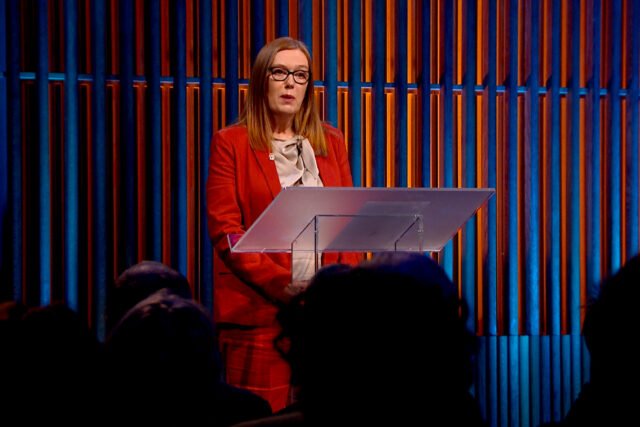Future pandemics may be even more deadly than COVID-19, so the lessons learnt from the outbreak must not be forgotten, and the world must be ready for the next viral onslaught, said one of the developers of Oxford’s Astra-Zeneca vaccine.
According to Johns Hopkins University, the new coronavirus has killed 5.26 million people worldwide, wiped out trillions of dollars in economic production, and turned billions of people’s lives upside down.
“The truth is, the next one could be worse. It could be more contagious, or more lethal, or both,” according to the BBC, Sarah Gilbert remarked in the Richard Dimbleby Lecture. “This will not be the last time a virus threatens our lives and our livelihoods.”
Today’s Concern: Omicron

Several coronavirus variations have evolved during the COVID-19 pandemic as the virus, SARS-CoV-2, continues to change and adapt. The alterations in many of these variants have little or no effect on how the virus affects humans. However, some factors, such as genetic modifications in the delta variant, can make the coronavirus more contagious than the original SARS-CoV-2 found in late 2019.
On the suggestion of WHO’s Technical Advisory Group on Virus Evolution, WHO recognised the variety B.1.1.529 as a variant of concern, dubbed Omicron, on November 26, 2021.
Although studies are still being conducted, it is clear that this variant is way more transmissible than its predecessors.
Researchers all over the world are now concerned about the future variants, which may be 100 times more lethal than some of the most notorious variants of today.
Also Read: Lessons Learnt From Past Pandemics That Can Be Put To Use Now
Tomorrow’s Concern: Unknown

The letter came as one of the ministers’ scientific advisers informed them that the new variety was spreading quickly in the UK, and that travel restrictions enacted on Tuesday would be too late to avert a wave of illnesses. On Sunday night, the UK Health Security Agency (UKHSA) announced 86 new Omicron cases, bringing the total number of cases identified to 246.
Gilbert claimed that, despite the destructive nature of a two-year epidemic that has already infected more than 265 million people, the next one might be more contagious and claim even more lives, in her 44th Richard Dimbleby speech, which was broadcast on the BBC on Monday.
“This will not be the last time a virus threatens our lives and our livelihoods,” she said. “The truth is, the next one could be worse. It could be more contagious, or more lethal, or both.”
Gilbert, a professor of vaccinology at the University of Oxford whose team produced the Covid vaccine, which is currently used in 170 countries, said the scientific breakthroughs and information acquired in coronavirus research must not be lost.
Efforts to end the COVID-19 pandemic have been unequal and fragmented, with low-income countries having limited access to vaccines while the “healthy and wealthy” in rich countries receive boosters, according to health experts.
A panel of health specialists convened by the World Health Organization to examine the handling of the SARS-CoV-2 pandemic has recommended that a new treaty provide permanent funding and increased power to study pandemics.
One option was for new funding for pandemic preparedness of at least $10 billion per year.
The COVID-19 epidemic was first discovered in late 2019 in China. Vaccines against the virus were created in record time.
According to Gilbert, the Omicron variant’s spike protein featured changes that increased the virus’s transmissibility.
“There are additional changes that may mean antibodies induced by the vaccines, or by infection with other variants, may be less effective at preventing infection with Omicron,” Gilbert said.
“Until we know more, we should be cautious, and take steps to slow down the spread of this new variant.“
Major Concern: Humanity’s Survival

How long it will take for SARS-CoV-2 to get eradicated is not known. Just when we think that maybe the virus is a thing of the past now, a new variant comes knocking at our doors.
It is particularly possible that someday a new variant may appear which will be humanity’s endgame. But it is equally possible as well that with little effort, that fate may be ignored.
“The advances we have made, and the knowledge we have gained, must not be lost,” Gilbert said.
In the end, it also comes down to us. If we unitedly work towards the same goal, nothing is going to remain impossible.
Image sources: Google Images
Sources: BBC, The Guardian, Reuters
Connect with the Blogger: Debanjan Dasgupta
This post is tagged under: COVID-19, Oxford, Astra-Zeneca vaccine, Johns Hopkins University, UK Health Security Agency (UKHSA), Sarah Gilbert, Richard Dimbleby Lecture, SARS-CoV-2, 44th Richard Dimbleby speech, WHO, B.1.1.529, Omicron, pandemic, next pandemic, vaccines, United Kingdoms, India, virus, coronavirus, epidemic
Also Recommended:
FlippED: Has The World Become More Dangerous Now, Compared To The Past?































